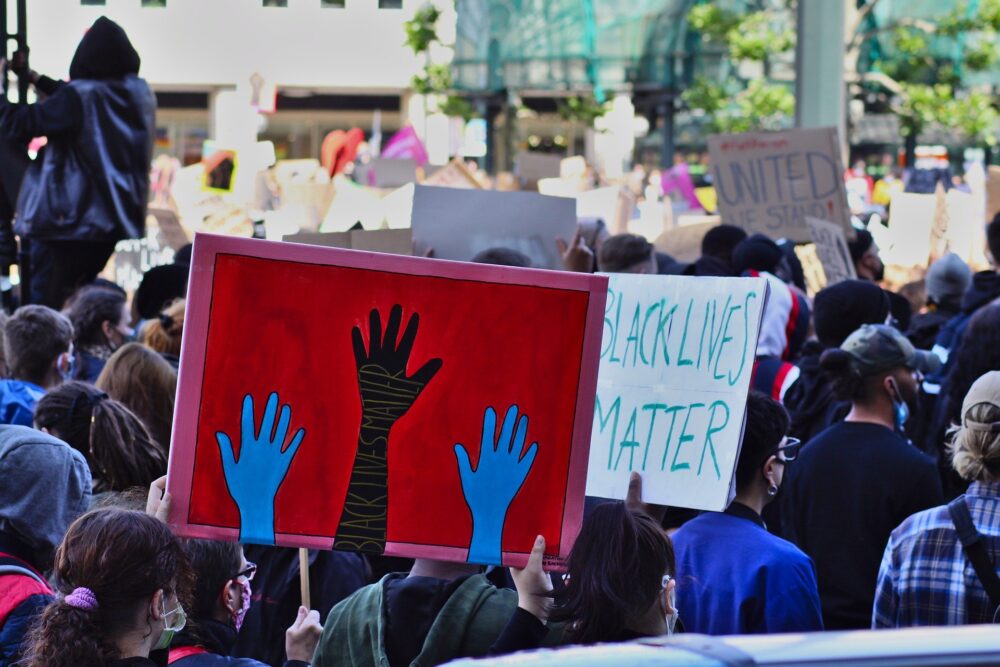This article continues a series on anti-racism in STEM co-authored by Northeastern alum Claire Williams. A fully collaborative effort, see the list of authors, contributors, as well as the series in its entirety at the following website: https://antiracisminstem.wordpress.com/
See other installments in this series: [ 1 // 2 // 3 // 4 // 5 // 6]
2. “Don’t politicize STEM! Stick to the science, not social issues.”
Scientific research is influenced by societal values and priorities. Scientists are people, which means that their opinions, biases, and beliefs will be present in STEM workspaces – this makes science inherently political [1]. In addition, many scientific studies deal with politicized subject matter due to the implications of their findings (i.e., climate science and COVID-19) [2]. Scientific findings that have direct and immediate societal, health, or safety implications frequently require the recruitment of political institutions out of ethical concern. The goal of activism in science is to use data-backed claims to support understanding, awareness, and action in the public, political, and governmental spheres. This does not interfere with the rigor of scientific claims. If scientists avoid communicating the far-reaching implications of their science for public health and safety in an effort to solely avoid politicization, this is an ethical failing [2].
Additionally, in nearly all countries, especially the U.S., scientific research is inherently involved in politics, and public perception and support of science are divided by party affiliation [3]. This is noteworthy, as historically a quarter or greater of science funding in the U.S. (and half of all funding for basic research) comes from government agencies [4]. The U.S. scientific funding landscape changes with changing political party representation. In response to this, universities and scientific societies have historically lobbied in support of increased scientific funding [5]. This relationship between governmental funding, influence of science on public policy, and lobbying on behalf of scientific interests further positions science in the political realm.
Beyond institutions, scientific theories have also been used to justify racism by manufacturing biological differences between races, such as the division of human beings into racial taxa by Carl Linnaeus or the co-opting of Darwinist principles by eugenicists [6], [7]. This phenomenon is not relegated to the past; even today, genetic research is often co-opted by white supremacist groups, misrepresented, and weaponized in support of racist ideas [8], [9]. The biological sciences are not unique in perpetuating racism. For example, machine learning models are frequently built using racially biased datasets [10]. This has led to widely-used algorithms (including for facial recognition or criminal recidivism) that are less accurate for BIPOC, perpetuating systemic racism in the criminal justice system [11], [12], [13].
Scientists are responsible for generating data and interpreting results that direct the course of many aspects of society. We have a responsibility to confront both our own biases and those present in the scientific literature in order to ensure that the data and guidance we produce is not perpetuating or enabling inequality. We must hold ourselves and our peers accountable, not only in issues of scientific integrity, but in issues of ethical integrity.
[1] Silence is never neutral; neither is science (Scientific American, 2020)
[2] Scientists who become activists: Are they crossing a line? (Journal of Scientific Communication, 2015)
[3] The Political Context of Science in the United States: Public Acceptance of Evidence-Based Policy and Science Funding (Social Forces 2015)
[4] Data check: U.S. government share of basic research funding falls below 50% (Science Magazine, 2017)
[5] Interest Groups, Political Party Control, Lobbying, and Science Funding: A Population Ecology Approach (Dissertation, UT Knoxville, 2014)
[6] A brief history of the enduring phony science that perpetuates white supremacy (The Washington Post, 2019)
[7] Toward the abolition of biological race in medicine (UC Berkeley Othering and Belonging Institute, 2020)
[8] “And we will fight for our race!” A measurement study of genetic testing conversations on Reddit and 4chan (International Conference on Web and Social Media, 2020)
[9] ‘It’s a toxic place.’ How the online world of white nationalists distorts population genetics (Science, 2018)
[10] Can AI be ethical? (Deloitte, 2019)
[11] Face recognition vendor test (FRVT) Part 3: Demographic effects (National Institute of Standards and Technology, 2019)
[12] How we analyzed the COMPAS recidivism algorithm (ProPublica, 2016)
[13] Abolish the #TechToPrisonPipeline: Crime prediction technology reproduces injustices and causes real harm (public letter, 2020)
3. “I’m not racist, so I don’t need to do anything.”
If you do not experience systemic racism, you are likely benefiting from it, whether by being more generously supported by your institutions, being assumed to belong, or, importantly, not bearing the significant mental and emotional burden of being subjected to racism. Racist policies only exist because those in power benefit from oppression of the minority group. If you are benefiting from the oppression of others and choosing not to acknowledge and dismantle it, your compliance perpetuates the system. You cannot claim to be “not racist” and do nothing about it; rather, we must be actively anti-racist and take steps to combat racism in our lives (see our Call to Action) [1].
Academics who are not part of underrepresented groups can leverage their privilege to move beyond passive allyship and become active “coconspirators” against racism [2]. There are a multitude of ways to work against racism at every level of the social-ecological model; they all start with self-education on the experiences of BIPOC and self-reflection on where you can create change [3]. Self-education is crucial, as the unpaid labor for anti-racism initiatives disproportionately falls upon faculty of color, who on average spend longer than their white colleagues promoting diversity-related initiatives [4], [5], [6]. In addition, Black faculty are more likely to engage in research that addresses systemic healthcare disparities [7].
Many academics also need to bring anti-racism into their experimental design. A growing body of evidence suggests that culture and environment play a significant role in how individuals perceive themselves and their environments [8]. However, the widely held belief that human behavior, perception, and memory are innate and should not differ across cultural groups can discourage scientists from collecting or considering data about culture and ethnicity as part of their research design. This often leads to non-representative studies that generalize the Western, educated, industrialized, rich, democratic experience to people from all cultures and ethnicities [8]. Researchers across all fields that study human biology and behavior have a key opportunity to exercise being inclusive and anti-racist by designing representative and robust studies.
Even if you are actively anti-racist, it is important to note that some degree of racial bias is present in all of us (even if it is subconscious), which can manifest as unintentional microaggressions rather than overt racism (discussed in response #1) [9]. For example, faculty preconceptions of students’ learning ability – such as whether the ability to obtain and retain knowledge is fixed or flexible – can exacerbate achievement gaps in STEM via subtle situational cues that reinforce stereotypes about which groups are more likely to excel [10]. Additionally, implicit bias can manifest at the faculty hiring level, as academic hiring committee members tend to prefer candidates who mirror their own training, values, and research interests [10]. The failure of institutions to train and continually combat implicit biases supports the continuation of practices that directly harm BIPOC. Acknowledgment of our implicit biases is necessary to continually improve teaching, mentoring, and hiring strategies at the systemic level.
[1] How to Be an Antiracist, by Ibram X. Kendi (NYT Bestseller)
[2] We want to do more than survive: Abolitionist teaching and the pursuit of educational freedom, by Bettina Love (2019)
[3] Being Antiracist (National Museum of African American History and Culture)
[4] The time tax put on scientists of color (Nature, 2020)
[5] Tips for easing the service burden on scientists from underrepresented groups (AAAS Letters to Young Scientists, 2019)
[6] Underrepresented faculty play a disproportionate role in advancing diversity and inclusion (Nature Ecology and Evolution, 2019)
[7] Topic choice contributes to the lower rates of NIH awards to African-America/black scientists (Science Advances, 2019)
[8] Why should we all be cultural psychologists? Lessons from the study of social cognition (Perspectives on Psychological Science, 2016)
[9] Anterior frontal lobe tracks the formation of prejudice (Journal of Cognitive Neuroscience, 2017)
[10] STEM faculty who believe ability is fixed have larger racial achievement gaps and inspire less student motivation in their classes (Science Advances, 2019)



